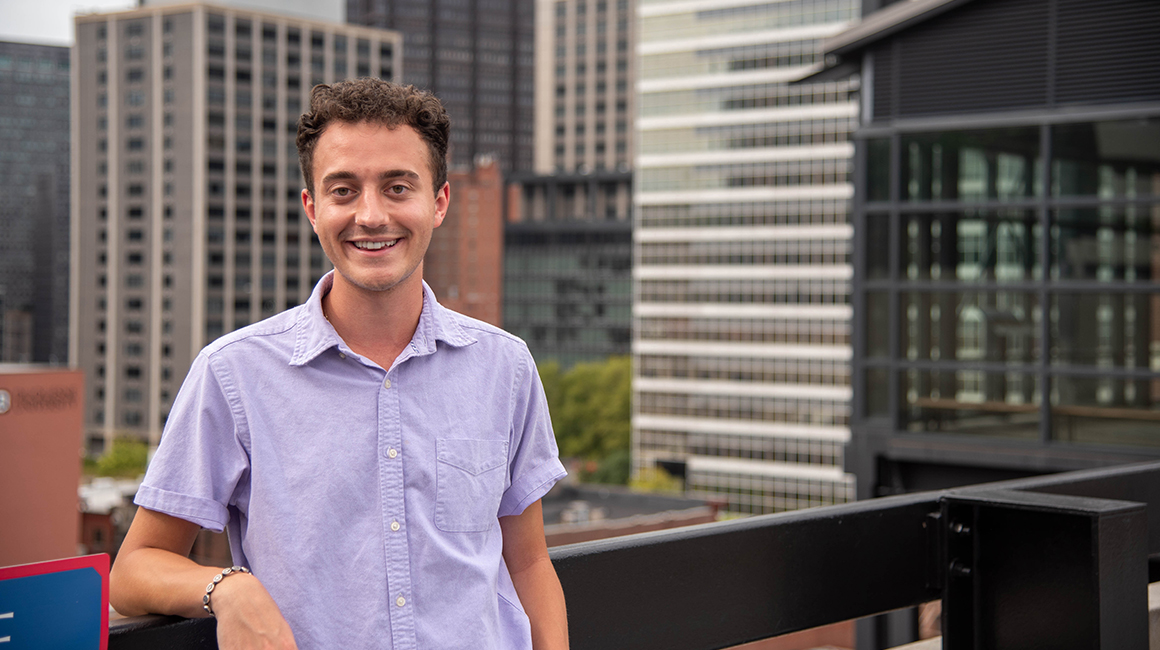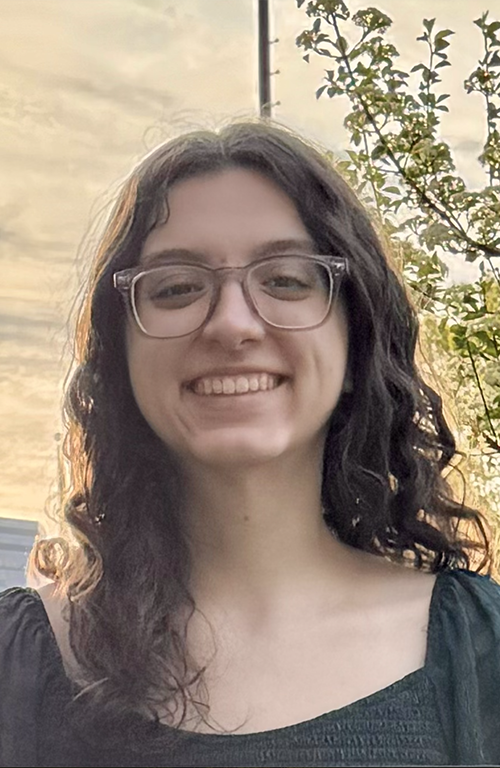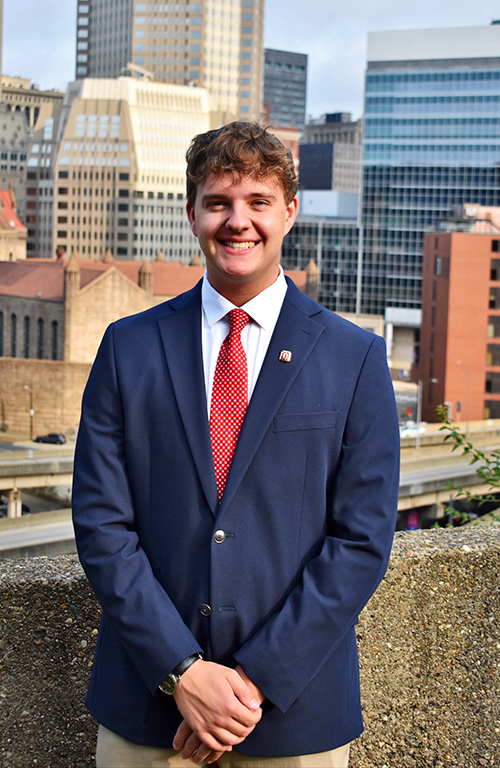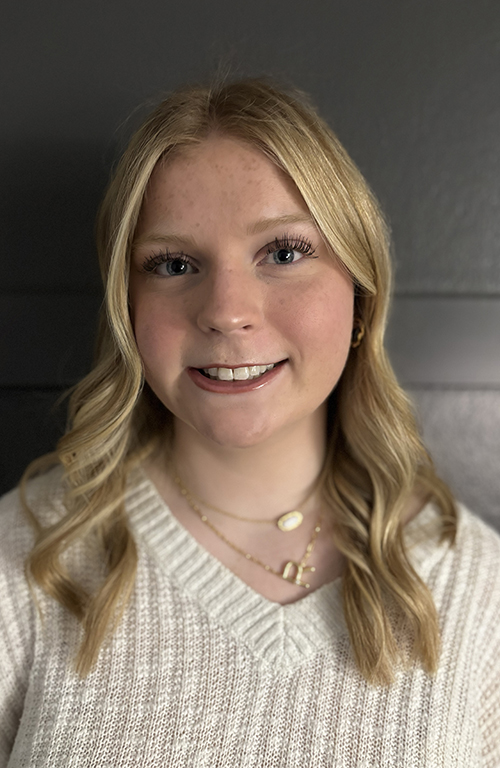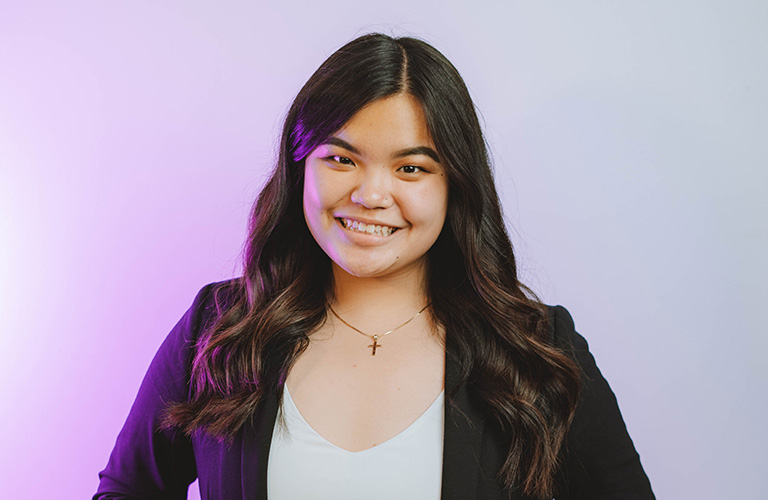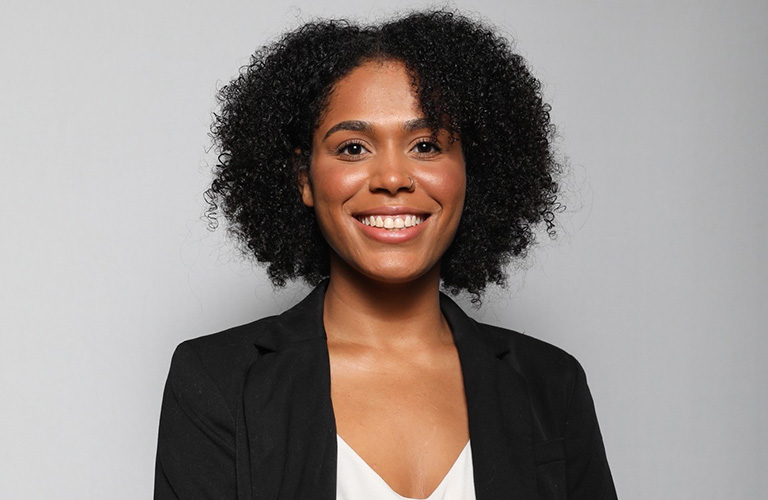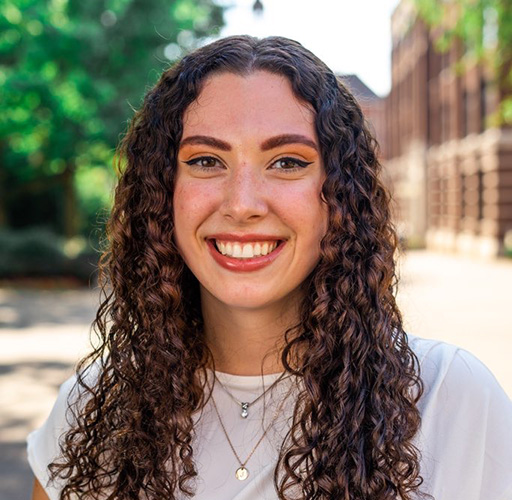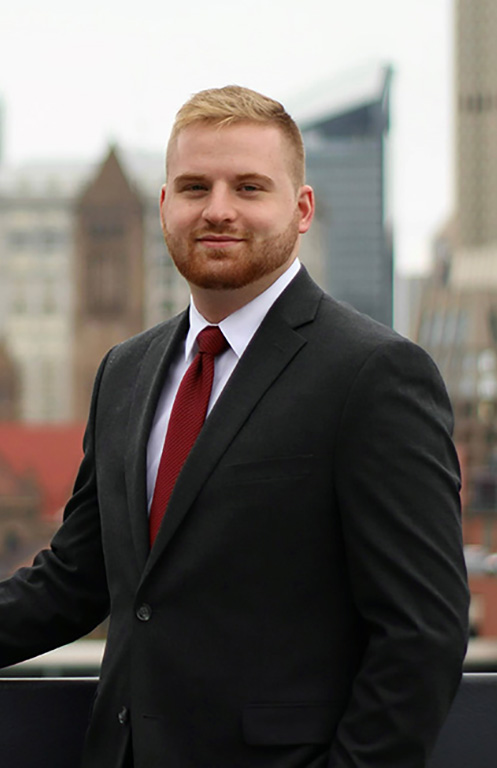Be Prepared for Anything
We know that acceptance into law school is not dependent on a particular undergraduate major. But we also know that the cutting-edge skills you'll develop in our 15-credit Pre-Law Certificate Program will successfully prepare you for law school, graduate public policy and foreign affairs programs, political careers and public service opportunities.
“Being part of the Pre-Law program at Duquesne has directly helped me to learn the skills that are most useful and will prepare me for law school. The pre-law classes have been challenging and thought provoking and have allowed me to work alongside students interested in pursuing law.”
A Horizon-Expanding Education
At Duquesne, learning happens everywhere.
In our Pre-Law Program, you’ll have access to over 50 courses from multiple disciplines across the University, including business, English, philosophy and political science, that count toward your Pre-Law Certificate.
You’ll engage in experiences that will develop your research, analytical and advocacy skills and build foundational knowledge for legal, governmental and public service. And you’ll learn to think critically, analyze deeply, communicate clearly and argue persuasively about important civil, legal and scholarly issues.
Our Pre-Law Center is housed in the Thomas R. Kline School of Law of Duquesne University and is offered in cooperation with the multiple undergraduate schools and departments within the University. The program supports undergraduates in all disciplines who are exploring cutting-edge subjects that will prepare them for law school, graduate public policy and foreign affairs programs, political careers and public service opportunities inside and outside of government.
We're Behind You, 100%
You'll have access to many resources that will help you succeed during your time on campus and beyond.
We take the responsibility of educating you seriously, and we do everything we can to help you succeed. You'll engage in experiences that will develop your research, analytical and advocacy skills and build foundational knowledge for legal, governmental and public service. And you'll learn to think critically, analyze deeply, communicate clearly and argue persuasively about important civil, legal and scholarly issues.
Open to undergraduates in all majors at Duquesne, our Pre-Law Certificate Program
offers many benefits including:
- Earn a 15-credit certificate that shows on your official transcript, a desirable qualification for employment, law school admission and/or continued professional education.
- Gain access to the 3+3 Early Admissions programs in Business, Liberal Arts, Music and Science & Engineering if you are an exceptional student, scoring in the 60th percentile on your LSATs or GREs, and seeking to complete your undergraduate studies in three years to begin Duquesne Kline School of Law in your fourth year. Requirements also include a 3.5 or higher GPA and an admission interview.
- Receive a $5,000 scholarship (in addition to other scholarships) upon enrollment into Duquesne Kline School of Law if you complete the certificate program with a 3.0 GPA or higher.
Pre-Law Timeline and Checklist
First and Second Years
- Meet with Dr. Kristen Coopie, Pre-Law advisor and Director of the Pre-Law Center. She can help you plan courses, and identify resources concerning legal education and the legal profession.
- Consider the 3-3 Early Admissions Program with Duquesne Kline School of Law, but remember that you do not need to participate in the 3+3 program to pursue the Pre-Law Certificate.
- Seek internships, shadowing opportunities, or jobs that expose you to lawyers at work. Find out as much as possible about the life of lawyers to decide whether to become a lawyer.
- Get to know at least one professor well each semester. They are all potential letter writers!
- Seek leadership positions in organizations with which you are involved.
- Find opportunities during summers that will set you apart from your classmates and help you learn more about law as a career.
Third Year
Practice for the LSAT. Not only is your score an important factor for admission, but it also is a significant factor for any financial aid package a school may offer you.
Fall Semester
- Start researching law schools online. The preLaw Magazine by the National Jurist and Max Pre-Law by Access Lex are a few of many great resources available.
- Attend law school fairs and information sessions.
Winter Break and Spring Break
- Visit law schools.
Spring Semester
- Take LSAT practice tests.
- Register for the LSAT.
June
- Take the LSAT.
- Start working on a personal statement.
- Bring personal statement to Pre-Law advisor, professors or the University Writing Center for help.
July/August
- Receive LSAT score.
- Locate web-based applications on LSAC or law schools' web sites.
- Register for the LSAC Credential Assembly Service.
- Consider registering for the option LSAC Candidate Referral Service, which gives you the opportunity to be contacted by law schools you may not have considered.
- Complete second draft of personal statement and seek feedback.
Fourth Year
September
- Complete application materials: the earlier the better, especially for financial aid.
- Don't hesitate to ask specific schools for application fee waivers if you are planning on applying.
- Ask professors or supervisors to write letters of recommendation. It is often helpful to provide them with a list of schools you are applying to, as well as a copy of your resume and transcript (it can be unofficial).
- Request transcripts from every college you ever attended and send to LSAC.
October
- Take the LSAT if you did not take it in June, or if you are taking it a second time. It is better to take it in October than in December!
- Complete last draft of personal statement.
- Submit application materials as early as possible.
- Thank professors for writing letters!
November/December
- Check to be sure applications are complete.
January
- File financial aid applications.
- Look into funding options: grants, scholarships, fellowships, and other opportunities.
Our location in the heart of Pittsburgh will put you in the center of a city full
of opportunities for gaining career experience. Students in our Pre-Law Program have
found a wide range of internships throughout the region, including with: Whether you go to law school or jump right into the workforce, you'll have a bright
future ahead of you.
Internships and Law Schools
Academic Internship Opportunities
Our Graduates Get the Job Done
Our Pre-Law Certificate graduates have gone on to work for leading companies, law
firms, non-profits and public institutions, or have enrolled at law schools throughout
the country, including:
Hear from Pre-Law Students and Alumni
Learning Together
We’ll help you discover what you’re good at and why that’s good for the world.
Our faculty are enthusiastic about your future, walking alongside you to help realize your boldest goals.
In our Pre-Law Center, you can:
- Learn more about law schools and legal careers.
- Meet with our Pre-Law Program Director to discuss your career goals, courses of study, LSAT registration and preparation, law school options and much more.
- Get involved with Duquesne’s Undergraduate Mock Trial Team and Pre-Law Society.
Helpful Resources
Law School Prep
Use this timeline and checklist as you prepare for law school.
LSAT
Most law schools require the Law School Admissions Test (LSAT). The test is administered online multiple times a year. Students are encouraged to take the test in June after their junior year or the fall of their senior year. Information about the LSAT and other aspects of law school admission can be found online at the Law School Admissions Council. The Pre-Law Director maintains a collection of books about the LSAT, law school and law careers.
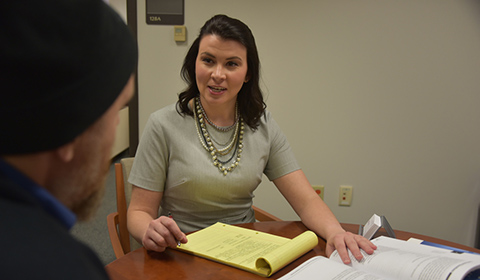
Learn more
Completion of our Pre-Law certificate requires a minimum of 15 credits in three out of four areas of emphasis.
Scholarships for Law School
Pre-Law Certificate Scholarship
Duquesne undergraduates who successfully complete the requirements of the Pre-Law Certificate with a 3.0 GPA or higher are eligible to receive a $5,000 scholarship for their first year at the Thomas R. Kline School of Law of Duquesne University. This scholarship is in addition to, and does not preclude consideration for, any other scholarship for which the student may qualify.
Merit Scholarships
Law schools offer merit scholarships to attract top students. These may pay for some or all of law school tuition. Before accepting any scholarship, make sure to check with other schools to see whether they might meet or better the first offer. Check too on conditions of the scholarship, e.g., whether it is conditional on maintaining a "B" grade or higher after the first year.
Only you can answer that question, but there are several ways to increase your chances
of making a good decision. Don't just watch "The Good Wife," "Law and Order" or "How
to Get Away With Murder." TV dramas dramatize and romanticize the professions they
portray, including the lives of lawyers. Instead of watching television, take action
and do so early in your college years, preferably in your freshman, sophomore or junior
years. Work, intern or volunteer at law offices. Even if you only do menial tasks and are not paid, it will be worth your while to
spend time at law firms, government law offices, courtrooms, or other legal settings
to see how lawyers actually work. If you go into law practice, it is likely that you
will be doing something similar in a few years. Would you enjoy doing what the lawyers
in your office do on a daily basis? Can you yourself as a lawyer doing these things
for many years? Observe court hearings and trials. Duquesne is located only minutes away from federal and state courthouses that are
open to the public and you! Take a few days to visit a courtroom and see litigators
in action. Although some lawyers never enter a courtroom, many do. Can you see yourself
litigating or judging? Would you enjoy it? Talk to lawyers. Ask your parents and friends if they know a lawyer. Call this person and quiz them
about their professional lives—what they like and dislike. Most people enjoy talking
with college students about their jobs. Try to obtain several perspectives, particularly
from lawyers who practice in different areas of law. Observe law school classes. The law school experience differs significantly from law practice, but "attending"
law school for a day can be a useful experience. In addition, ask law students you
know about their experiences. Read reliable books about the lives of lawyers. Check the ratings of lawyer satisfaction in the books. Sadly, lawyers as a whole
are one of the least satisfied groups of professionals in the country, and many switch
to new careers after several years of practice. But others love the law! Most people practice law with a Juris Doctor (J.D.), but law practice is extremely
diverse in its subject matter, everything from aviation law to workers' compensation.
In a general sense, however, most lawyers do similar things: they analyze practical
problems faced by individuals and organizations, and they use their writing and oral
skills to solve those problems. This takes place in many settings from the law library
and law office to the courtroom. Lawyers work in the private sector, in government offices, and in nonprofit organizations.
While lawyers are "service" professionals, those they serve are extremely diverse—the
rich and the poor, guilty and innocent, corporations and individuals, etc. Your own
personal philosophy should guide you in deciding who you want to serve as a lawyer.
Many people also use a law degree to land jobs outside law, in business, academia,
or other endeavors. But most people do practice law with their J.D. and you generally
should not attend law school unless you plan to practice law, at least initially. Explore many law or law-related careers that our Duquesne Kline School of Law graduates now do. Throughout your career at Duquesne, you should be taking challenging courses that
require analytic thinking, high level reading, and extensive writing. This is the
best preparation for law school. Work hard at your classes and earn good grades. Do not take your freshman year (or
any other year) for granted. When you apply for law school, your freshman year will
be 1/3 of the grades that law schools will review. It is important to do well throughout
your college career. Use the Pre-Law Timeline and Checklist to guide yourself. Talk to the Pre-Law Program Director. Anything that interests you, from chemistry to political science to philosophy, as long as the major has rigorous courses, with significant amounts of
reading, analysis, and writing. Law schools prefer that you broaden and challenge
yourself as an undergraduate. There is time enough for you to specialize in law school
(or other grad schools). College is a time to explore new and interesting areas of
study--and law schools encourage that, rather than narrow pre-professional training. Certain courses in your major may help in your preparation for law school. In addition, the Political Science Department offers a Minor in Law & Politics open to students in any major. Political science majors may also take a Concentration in Law & Politics. Majors in the Palumbo-Donahue School of Business at Duquesne may also pursue the Legal Studies minor. First, never take the LSAT without preparation. This is a difficult test that demands significant practice and thorough preparation.
Every score you receive on it will be reported to law schools, and many schools will
average two or more scores in deciding on admissions. Second, study hard for the LSAT. Many students take LSAT preparation courses. The
Pre-Law Program takes no position on the merit of these courses. If you are a self-motivated
student who is serious about studying a test prep book, you may not need a prep class.
If you do not believe you have the discipline to study on your own for several months,
take a class. Whether or not you take an LSAT course, be sure to take several practice
tests under real test conditions, most importantly strict timing. This is critical
so that you go into the LSAT knowing the format of questions and the speed with which
you will need to answer them. Most law schools will take your highest score on multiple tests. In this case, it
may sometimes make sense to retake the LSAT, to improve your chances of admission
and of obtaining financial aid. Check with individual schools to determine their policy
on re-takes. If you have already submitted an application but are planning on retaking
the LSAT, you can always send an email to the Admissions Office at the schools you
have applied to, letting them know of your upcoming exam. Some law schools average scores from multiple LSAT testings. For these schools, your
chances of dramatically improving on your first score are small, unless you really
did blow the first exam. How would you know if that is the case? If in the timed practice
tests that you took before the LSAT, you consistently scored much higher than the
score you received on the real test, there is a good chance that you may be able to
improve on a retake. In this circumstance, it may make sense to retake. First time test-takers can also take advantage of the LSAT Score Preview option. First-time test takers who sign up for score preview will receive their scores at
the same time other test takers receive theirs (assuming they have completed their
LSAT Writing and have no holds on their accounts), and will have six (6) calendar
days to decide if they want to cancel or keep their score. If no action is taken,
their scores will be added to their LSAC account and released to law schools to which
they have applied at the end of the six-day period. Score preview costs $45 for candidates
who sign up prior to the first day of testing for a given test administration, or
$75 for those who sign up during a specified period after their test administration. Various organizations, including most prominently U.S. News & World Report magazine, rank law schools using a variety of criteria, from professorial scholarship
to alumni giving to entering students' LSAT scores. How useful these rankings are
for the most important issue—the law school's ability to teach you law — is questionable. For better or for worse, however, the rankings have considerable importance. If you
go to a high ranked law school, your fellow students are, on average, likely to have
much higher LSAT scores than if you attend a low ranked school. As a result, your
in-class experience is likely to be richer and more challenging. The rankings also
have a major impact on your job opportunities immediately after law school. If you
graduate from a top ranked school, major law firms and other employers may seek you
out for high-paying jobs and you may have opportunities to practice law in a variety
of settings. If you attend a lower ranked school, you will have to work harder to
find employment as a lawyer and your opportunities and salary will be smaller. All that said, it is also true that if you do well in a law school of any rank you
will have a good chance of eventually finding a job in law. Particularly if you make
the school's law review and clerk for a judge, you will likely have a wide variety
job opportunities. Finally, bear in mind that your law school is most important in landing only your
first job. Thereafter, your skills and reputation as a lawyer will determine how far
you can go with your law degree.Frequently Asked Questions


